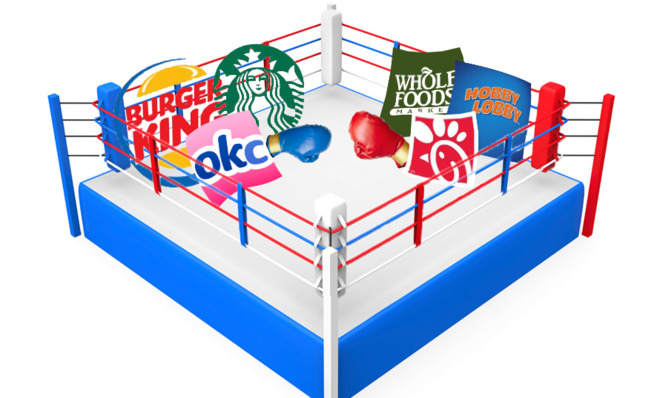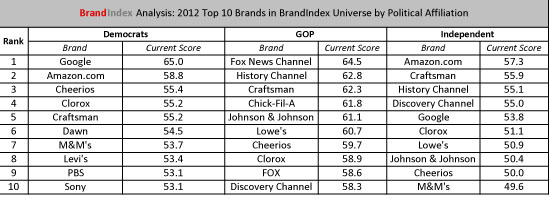The political battleground of the future is already in your shopping cart
Forget red vs. blue states: the future is in red vs. blue products

A free daily email with the biggest news stories of the day – and the best features from TheWeek.com
You are now subscribed
Your newsletter sign-up was successful
The other day I was blocked from viewing a blog because I was using the wrong browser.
I use Firefox, and the blog owner had prohibited that browser from viewing her site in response to the defenestration of former Mozilla CEO Bredan Eich over his opposition to same-sex marriage. Instead of the site, I was automatically redirected to a message about the importance of standing up for what's right, along with helpful links to sites that would allow me to download alternative browsers.
Inventive as this example of political protest may be, it is hardly unique. In fact, across the political spectrum, people are increasingly basing their consumer decisions on a company's politics.
The Week
Escape your echo chamber. Get the facts behind the news, plus analysis from multiple perspectives.

Sign up for The Week's Free Newsletters
From our morning news briefing to a weekly Good News Newsletter, get the best of The Week delivered directly to your inbox.
From our morning news briefing to a weekly Good News Newsletter, get the best of The Week delivered directly to your inbox.
Consider a couple of examples. In 2012, comments by Chick-fil-A CEO Dan Cathy about same-sex marriage sparked protests and calls for boycotts. When Whole Foods CEO John Mackey wrote an op-ed criticizing ObamaCare, liberals held in-store performance art protests, and called for a boycott. Efforts are currently underway to organize boycotts of Hobby Lobby, Eden Foods, and other companies that have successfully challenged the Obama Administration's contraceptive mandate. Sodastream is facing a boycott campaign over its involvement with the West Bank. And even Brendan Eich's resignation from Mozilla was sparked when the dating site OKCupid announced that it would no longer use Firefox because of Eich's donation to an anti-same sex marriage ballot initiative.
And as my initial example shows, attempts to punish companies for their political stances aren't confined to the left. In addition to Firefox, some conservatives are boycotting Starbucks and Burger King over their support for same-sex marriage. The father of a friend of mine has announced that he won't use Google or visit the state of Colorado because he thinks they are too liberal.
Some of these efforts are well organized. But in many cases it seems individuals aren't trying to use their consumer choices to influence companies to change, but simply because "I don't want to give money to people who think like that."
Boycotts aren't new, of course. But politically conscious shopping does seem to be on the rise, and two factors suggest that the trend will continue to grow.
A free daily email with the biggest news stories of the day – and the best features from TheWeek.com
First, Americans are getting more polarized. According to a recent Pew report, both left and right in America have grown more "ideologically consistent" over the last few decades. Republicans are more uniformly conservative and Democrats are more uniformly liberal. Meanwhile, disdain between people who do not share ideological views has grown. Twenty-seven percent of Democrats view Republicans as a threat to the nation's well-being, while 36 percent of Republicans view Democrats similarly harshly. Not giving a company your business based on its political views is easier to justify when you see those views not simply as wrong, but as fundamentally dangerous.
Marketing research also shows that liberals and conservatives are divided not only in their political views, but in what type of alcohol they prefer, which restaurants they eat at, and which sports and TV shows they watch. This is how YouGov's BrandIndex broke down consumers by political ideology last year:

When 2014's numbers come out, I wouldn't be surprised to see Hobby Lobby join Chick-Fil-A on the GOP's Top 10 list, and Mozilla joining Google for the Democrats'.
Personally, I view this trend toward ideological commerce with a mixture of dread and resignation. Consumer decisions are often based not simply on objective measures of price and quality, but on how using a particular brand reflects one's identity. So in an age of political self-expression, it is almost inevitable that political factors will play an increasingly prominent role in that branding.
Nevertheless, it would be nice to choose a soft drink without having to think about what it says about my stance on global warming.
Josiah Neeley is a Policy Analyst for the Armstrong Center for Energy and the Environment at the Texas Public Policy Foundation.